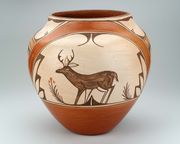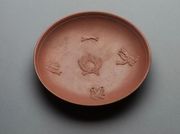Difference between revisions of "Slip"
Jump to navigation
Jump to search
m (Text replace - "== Authority ==" to "== Sources Checked for Data in Record ==") |
|||
| (One intermediate revision by one other user not shown) | |||
| Line 1: | Line 1: | ||
| − | [[File:1984.636-SC43984.jpg|thumb|]] | + | [[File:1984.636-SC43984.jpg|thumb|Effigy figure<br>MFA# 1984.636]] |
== Description == | == Description == | ||
| − | + | [[File:1993.950-SC43380.jpg|thumb|Water jar<br>MFA# 1993.950]] | |
| − | A thin, aqueous suspension of [ | + | [[File:2001.263-SC19854.jpg|thumb|Roman dish<br>MFA# 2001.263]] |
| + | A thin, aqueous suspension of [[clay|clay]] in [[water|water]] prepared to a creamy consistency. Slip was originally used as a thin, light-color coating over red clay pieces. Now slip is used for decorating pottery. It is available in many colors, such as white, black, blue, and green. Slip that contains a significant portion of non-clay material is called [[engobe|engobe]]. | ||
== Synonyms and Related Terms == | == Synonyms and Related Terms == | ||
| Line 8: | Line 9: | ||
engobe (Fr., Port.); barbotine (Fr.); slip (Ned.) | engobe (Fr., Port.); barbotine (Fr.); slip (Ned.) | ||
| − | == | + | ==Resources and Citations== |
| − | |||
| − | |||
| − | |||
| − | |||
| − | |||
| − | |||
| − | |||
| − | |||
* Ralph Mayer, ''A Dictionary of Art Terms and Techniques'', Harper and Row Publishers, New York, 1969 (also 1945 printing) | * Ralph Mayer, ''A Dictionary of Art Terms and Techniques'', Harper and Row Publishers, New York, 1969 (also 1945 printing) | ||
| Line 22: | Line 15: | ||
* Richard S. Lewis, ''Hawley's Condensed Chemical Dictionary'', Van Nostrand Reinhold, New York, 10th ed., 1993 | * Richard S. Lewis, ''Hawley's Condensed Chemical Dictionary'', Van Nostrand Reinhold, New York, 10th ed., 1993 | ||
| − | * ''Encyclopedia Britannica'', http://www.britannica.com Comment: "slipware." | + | * ''Encyclopedia Britannica'', http://www.britannica.com Comment: "slipware." Accessed 4 Feb. 2005 . |
[[Category:Materials database]] | [[Category:Materials database]] | ||
Latest revision as of 12:22, 31 May 2022
Description
A thin, aqueous suspension of Clay in Water prepared to a creamy consistency. Slip was originally used as a thin, light-color coating over red clay pieces. Now slip is used for decorating pottery. It is available in many colors, such as white, black, blue, and green. Slip that contains a significant portion of non-clay material is called Engobe.
Synonyms and Related Terms
engobe (Fr., Port.); barbotine (Fr.); slip (Ned.)
Resources and Citations
- Ralph Mayer, A Dictionary of Art Terms and Techniques, Harper and Row Publishers, New York, 1969 (also 1945 printing)
- Richard S. Lewis, Hawley's Condensed Chemical Dictionary, Van Nostrand Reinhold, New York, 10th ed., 1993
- Encyclopedia Britannica, http://www.britannica.com Comment: "slipware." Accessed 4 Feb. 2005 .


